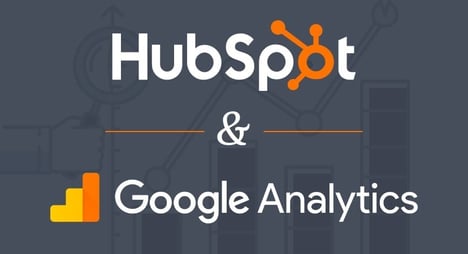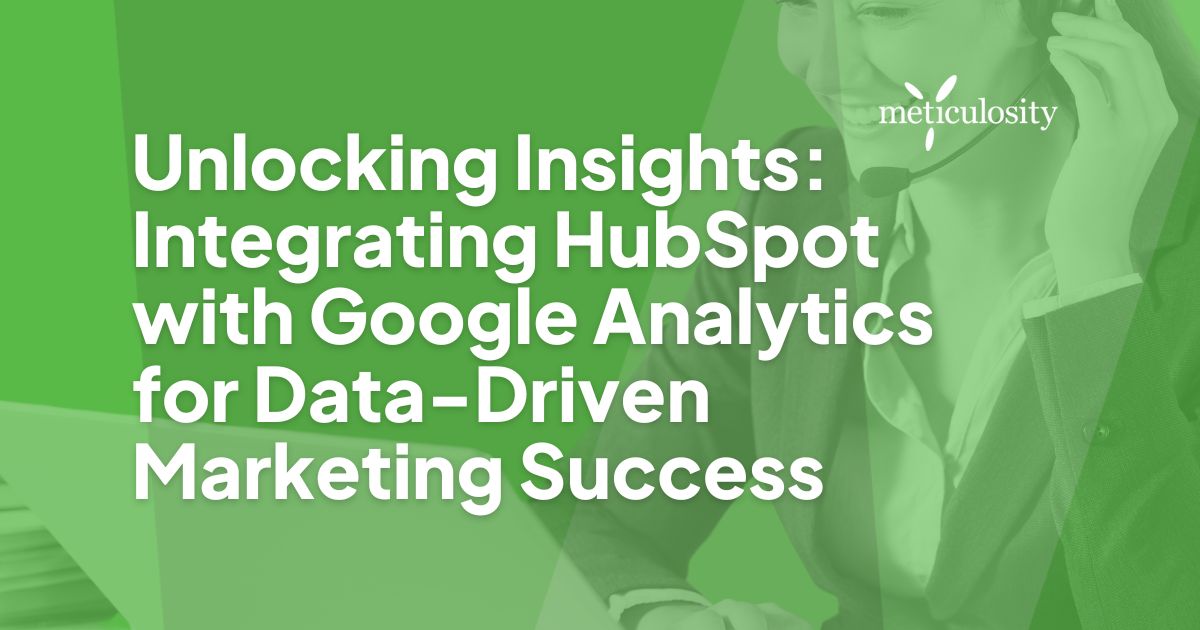Sailing through the vast ocean of marketing data can feel like a monumental undertaking.
In this blog post, we'll embark on an adventure of mastering both tools effectively together, unlocking treasure troves of valuable insights and strategies for your business.
Key Takeaways
- Integrating HubSpot with Google Analytics gives businesses more accurate data and a better understanding of customer behavior.
- This integration allows businesses to track website traffic, analyze user behavior, and measure conversions effectively.
- By combining the features and benefits of both platforms, marketers can create data-driven marketing strategies that yield higher ROI.
Understanding HubSpot and Google Analytics
HubSpot and Google Analytics are powerful tools that can provide businesses with valuable data insights and help drive marketing success.
Features and Benefits
HubSpot makes your work easy. It helps you track visits and clicks on your site. Also, it shows you who is visiting and how they found you. Google Analytics gives more data. It tells what pages people visit the most and where they come from online.
Both offer different good things for marketers. They can help drive more traffic to your website if used together well.
Why Integrate HubSpot with Google Analytics?
Integrating HubSpot with Google Analytics is crucial for businesses looking to gain a holistic view of their data and make informed decisions. Find out why this integration is essential for marketing success.
Importance for businesses
Businesses need to know how people use their websites. HubSpot and Google Analytics can help with this. Using them together gives you more data to look at. This data can tell you what works and what doesn't for your business.
With these facts, you can make better choices for your company. You can see where visitors come from and what pages they stay on the most. It's like a road map that shows you how to reach your goals faster.
Holistic view of data
Combining HubSpot and Google Analytics gives you a whole view of data. All your numbers are in one place. You can see how well your website, blogs, and ads are doing. This helps you understand what works and what does not.
It shows you where to put more effort. This combo is like a big magnifying glass for your business!
How to Integrate HubSpot and Google Analytics
Learn how to seamlessly integrate HubSpot and Google Analytics with our step-by-step guide, ensuring accurate data tracking and providing a holistic view of your marketing efforts.
Step-by-step guide
Here's a step-by-step guide to integrating HubSpot with Google Analytics for data-driven marketing success:
- Start by signing in to your HubSpot account.
- In the top right corner, click on your account name and select "Integrations" from the dropdown menu.
- Scroll down and click on "Google Analytics".
- Click on the "Connect" button next to Google Analytics.
- You will be prompted to sign in to your Google Analytics account. Enter your credentials and click "Allow" to grant access.
- Once connected, you can choose which Google Analytics property to link with HubSpot.
- Select the desired property and click "Save".
- HubSpot will then begin syncing data from Google Analytics into your account.
- To view the data, go to the Reports dashboard in HubSpot and navigate to the Google Analytics section.
- Here, you can explore various reports and metrics based on your integrated data.
Troubleshooting tips
Here are some troubleshooting tips to help you integrate HubSpot with Google Analytics smoothly:
- Double-check your tracking codes: Make sure that the tracking codes for both HubSpot and Google Analytics are installed correctly on your website.
- Verify data syncing: Confirm that your HubSpot and Google Analytics accounts are properly linked and syncing data accurately.
- Check filters and goals: Review your filters and goals in Google Analytics to ensure they are set up correctly and capturing the right data.
- Test custom events and conversions: If you have set up any custom events or conversions in HubSpot, test them to make sure they are being tracked correctly in Google Analytics.
- Monitor attribution reports: Keep an eye on your attribution reports in both HubSpot and Google Analytics to see if there are any discrepancies or missing data.
Are you looking to optimize HubSpot for your business? Learn how to improve here.
Benefits of Integrating HubSpot and Google Analytics
Integrating HubSpot with Google Analytics offers businesses more accurate data, a better understanding of customer behavior, and the ability to drive data-driven marketing strategies.
More accurate data
Integrating HubSpot with Google Analytics provides businesses with more accurate data. By connecting the two platforms, you can get a holistic view of your marketing efforts and track customer behavior more effectively.
This integration ensures that all the data from HubSpot is accurately recorded in Google Analytics, giving you a comprehensive understanding of how your campaigns are performing. With reliable and precise data at your fingertips, you can make informed decisions to optimize your marketing strategies and drive better results.
Better understanding of customer behavior
By integrating HubSpot with Google Analytics, you can gain a better understanding of your customers' behavior. This integration allows you to track their actions on your website, such as the pages they visit, how long they stay, and what actions they take.
With this data, you can identify patterns and trends in customer behavior and use it to inform your marketing strategies.
For example, if you notice that many customers are leaving your website without purchasing, you can analyze their journey and make improvements to increase conversions. You can also see which marketing channels are driving the most traffic and engagement so that you can allocate resources accordingly.
Data-driven marketing strategies
Data-driven marketing strategies are essential for businesses to make informed decisions and drive success. By integrating HubSpot with Google Analytics, you can access more accurate data and get a better understanding of customer behavior.
This integration allows you to track website traffic, analyze user behavior, and measure conversions. With these insights, you can personalize your marketing efforts and target specific audiences effectively.
By regularly monitoring data and leveraging the integrated features, you can maximize the benefits of this integration and create impactful campaigns that yield high ROI.
Leveraging Google Analytics for Marketing
Google Analytics provides valuable insights into website traffic, allowing marketers to analyze user behavior and track conversions effectively.
Analyzing website traffic
Analyzing website traffic is a crucial aspect of understanding how your marketing efforts are performing. By integrating HubSpot with Google Analytics, you can gain valuable insights into the traffic coming to your website.
With Google Analytics, you can track metrics such as the number of visitors, the pages they visit, and how long they stay on each page. This information helps you understand which pages are popular and which may need improvement.
By analyzing website traffic data, you can make informed decisions about your marketing strategies and optimize your website for better results.
Tracking user behavior and conversions
Understanding how users behave on your website and their actions can provide valuable insights for your marketing strategies. You can track user behavior and conversions more effectively by integrating HubSpot with Google Analytics.
With this integration, you can analyze website traffic, see which pages users visit most, and understand how they navigate your site. You can also track conversions, such as form submissions or purchases, to measure the success of your marketing efforts.
By monitoring these metrics, you'll better understand what is working well and what needs improvement to make data-driven decisions for your marketing campaigns.

Connecting HubSpot and Google Analytics for Better Insights
Integrate your contact and lead data from HubSpot with Google Analytics to gain a comprehensive understanding of customer behavior and measure the success and ROI of your marketing efforts.
Integrating contact and lead data
Integrating contact and lead data is a crucial step in unlocking valuable insights for your marketing efforts. By bringing together the data from HubSpot and Google Analytics, you can gain a comprehensive view of your customer interactions throughout their journey.
This integration allows you to track and analyze how leads interact with your website, emails, and campaigns. With this information, you can better understand their preferences and behavior, enabling you to personalize your marketing messages and drive more targeted campaigns.
By integrating contact and lead data, you can measure the success of your marketing strategies accurately and make informed decisions based on real-time data.
Measuring success and ROI
You can rely on various metrics and data to measure the success and ROI (return on investment) of integrating HubSpot with Google Analytics. One important metric is website traffic, which you can track using Google Analytics.
By analyzing the number of visitors to your site and their behavior, such as how much time they spend on each page or if they convert into leads or customers, you can understand if your integrated efforts are driving more engagement.
Another metric to consider is lead generation and conversion rate. With HubSpot's CRM system integrated with Google Analytics, you can track how many leads are coming from specific campaigns or channels.
This allows you to measure your marketing efforts' effectiveness in capturing leads and converting them into sales.
Lastly, analyzing the impact on revenue generated from these integrated efforts is essential. By tracking customer acquisition costs (CAC) compared to customer lifetime value (CLTV), you can determine whether your investments in integrating HubSpot with Google Analytics are generating a positive ROI.
Personalization and Targeting with Integrated Data
Leveraging the integrated data from HubSpot and Google Analytics allows marketers to create personalized marketing campaigns and target specific audiences based on their behavior and preferences.
Using data for personalized marketing
Utilizing data from integrated platforms like HubSpot and Google Analytics is crucial to personalize marketing campaigns. By leveraging this data, marketers can gain insights into customer behavior, preferences, and interests.
This information allows for the creation of targeted and personalized content that resonates with individual customers on a more personal level. With the ability to segment audiences based on various criteria, such as demographics or past interactions, marketers can tailor their messaging to specific groups or individuals.
Personalized marketing enables businesses to deliver relevant messages at the right time and through their customers' preferred channels, resulting in higher engagement rates and potentially increased conversions.
Targeting specific audiences
To make your marketing efforts more effective, it's important to target specific audiences. By integrating HubSpot with Google Analytics, you can gather data that will help you understand your audience and their interests.
This information allows you to create personalized marketing campaigns that speak directly to your target audience's needs and interests. By leveraging the integrated data from HubSpot and Google Analytics, you can reach the right people at the right time with the right message, resulting in higher engagement and conversion rates.
So, don't miss out on the opportunity to maximize your marketing success by targeting specific audiences through integration.
Maximizing the Benefits of HubSpot and Google Analytics Integration
Regularly monitoring data and making informed decisions help businesses maximize the benefits of integrating HubSpot and Google Analytics.
Regularly monitoring data
Monitoring data is essential for marketers and business professionals who want to drive success through data-driven marketing strategies. By closely monitoring the metrics and insights provided by integrated HubSpot and Google Analytics, you can make informed decisions about your campaigns and measure their success.
Regular monitoring allows you to track website traffic, analyze user behavior, and identify areas where you can improve customer engagement. It helps you stay agile in adapting your marketing tactics based on real-time data, ensuring that you are always targeting the right audiences with personalized messages.
So don't underestimate the power of regularly checking your data – it's the key to unlocking better results for your marketing efforts.
Making informed decisions
To make informed decisions, it's crucial to integrate HubSpot with Google Analytics. Connecting these two platforms gives you access to more accurate data and a better understanding of customer behavior.
This information allows you to create data-driven marketing strategies that yield better results. Additionally, the integration allows you to measure success and ROI, giving you valuable insights into the effectiveness of your campaigns.
Regularly monitoring the data from both platforms allows you to stay ahead of the game and make smart choices for your business.

Conclusion
In conclusion, integrating HubSpot with Google Analytics is essential for businesses seeking data-driven marketing success. By combining the features and benefits of both platforms, companies gain a holistic view of their data, leading to more accurate insights and a better understanding of customer behavior.
With this integration, marketers can leverage Google Analytics to analyze website traffic and track user behavior and conversions. By connecting HubSpot and Google Analytics, businesses can optimize their marketing strategies through personalized targeting and make informed decisions based on real-time data.
Click here to learn more about HubSpot marketing.
FAQs
1. What is the HubSpot Google Analytics integration, and why is it beneficial for my marketing efforts?
The HubSpot Google Analytics integration allows you to connect your HubSpot account with Google Analytics, providing a comprehensive view of your website's performance and user interactions. This integration benefits marketers as it helps track key metrics, understand user behavior, and align marketing strategies with data-driven insights from Google Analytics.
2. How can I set up my website's HubSpot Google Analytics integration?
-
Access Integration Settings: In your HubSpot account, go to "Settings" and select "Reports" > "Analytics Tools."
-
Connect to Google Analytics: Choose "Connect Google Analytics" and follow the prompts to authenticate and grant permissions to HubSpot.
-
Configure Tracking Settings: Once connected, configure tracking settings such as the default source and medium and enable additional tracking features as needed.
-
Verify Setup: Confirm the integration by checking that data from your HubSpot-hosted pages is being accurately reported in your Google Analytics account.
3. What types of data can I access through the HubSpot Google Analytics integration?
The integration allows you to access a variety of data to gain insights into your website's performance:
-
Traffic Sources: Understand where your website traffic is coming from, whether it's organic search, social media, referrals, or direct visits.
-
User Behavior: Track user interactions, including pageviews, time on page, and bounce rates, providing insights into user engagement.
-
Conversion Tracking: Analyze conversion events and goals to evaluate the effectiveness of your marketing efforts.
-
Audience Segmentation: Utilize Google Analytics audience data to create targeted marketing campaigns in HubSpot.
4. Can I use the HubSpot Google Analytics integration for goal tracking and conversion analysis?
Yes, the integration facilitates goal tracking and conversion analysis by syncing data between HubSpot and Google Analytics:
-
Set Up Goals: Define and set up specific goals in your Google Analytics account, such as form submissions, purchases, or other meaningful interactions.
-
Sync with HubSpot: The integration ensures that data on these goals is synced with your HubSpot account, allowing you to analyze conversion rates and the effectiveness of various marketing channels.
-
Reporting and Insights: Access HubSpot's reporting tools to analyze how different marketing activities contribute to the goals in Google Analytics, providing a more holistic view of your conversion funnel.
By combining the power of HubSpot and Google Analytics, you can better understand your website's performance and optimize your marketing strategies for better results.







